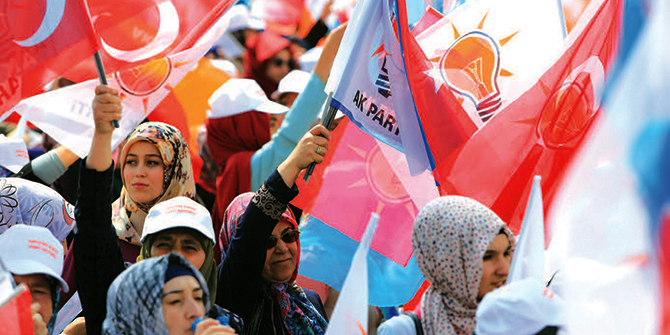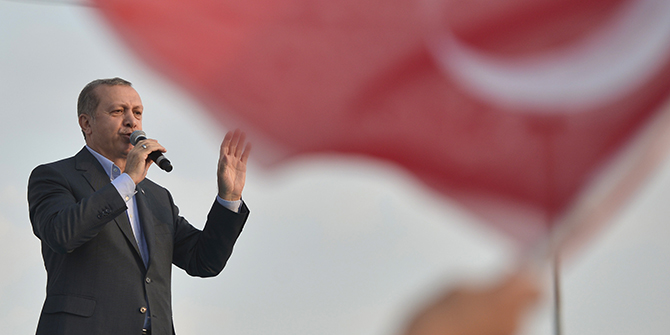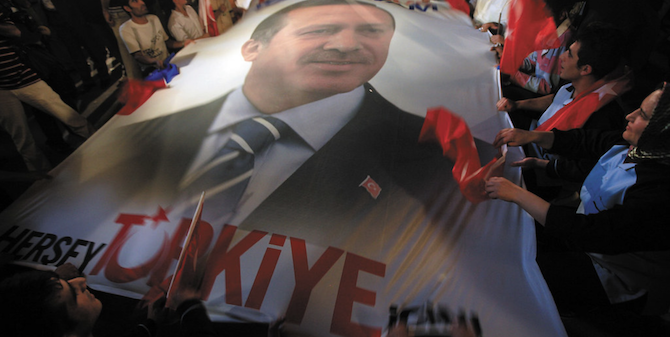by Deniz Çifçi

Turkey once again went to polling stations on 1 November, just six months after the 7 June elections. This was very unusual considering Turkey’s election history. The initial elections of June ended the Justice and Development Party’s (AKP) twelve-year single-party government, even though it received 40.87% of the votes. Such a fall was one of the most shocking defeats witnessed in the party’s entire history. Along with the party’s political identity, its ‘controlled-tension’ strategy – which in turn put pressure on the party’s relationship with the majority of Alawis, Secular Turks and the Kurds – has created a large opposition. Many therefore saw the AKP’s loss in the June elections as the beginning of the end.
The AKP’s failing to secure 276 seats in Parliament to form a one-party rule government, on the other hand, gave the opposition parties – principally the Republican People’s Party (CHP) and Nationalist Political Party (MHP) – the opportunity to establish either a coalition or minority government. This was a first in Turkey since 2002. Both CHP and MHP, however, missed this window of opportunity giving President Recep Tayyip Erdoğan a reason to call for a snap election despite the risks posed for the AKP. Had the party not receive enough votes to form a one-party government, it would have most likely be subject to many legal cases as part of a new parliament. The Turkish corruption case of December 2013 was only one of these serious threats, which the AKP considered a coup against its authority.
In that sense, the party’s defeat in the June elections put the AKP’s existence in jeopardy. Taking into account ideological, sectarian and ethnic polarisation in Turkey, a setback or even collapse would likely have been rapid for the AKP. To avoid this,Recep Tayyip Erdoğan took a political gamble with the hope of regaining the majority of the votes and then forming a single-party government. By receiving almost half of the ballots (49.5%), far beyond expectations, in the most recent elections, his gamble was well worth it.
The main opposition party (CHP) received almost a similar number of votes as in June (25.31%), while the another two opposition parties – the MHP and the People’s Democratic Party (HDP) – lost a considerable number of votes to the AKP, obtaining only 11.9% and 10.76% of the votes respectively. Here, an important question should be considered: despite a bad judgment in foreign policy (particularly regarding Syria), being not only challenged but also hated by a considerable number of voters, and most importantly being defeated only a few months ago; how did the AKP win the election with a great, even historic, victory?
The AKP’s success can be explained by considering two factors: the failure of the opposition and the party’s ability to read the needs of the people and accordingly shape and design its politics. The opposition parties, based on the votes received in June, had two alternatives to form a government: either a coalition with the AKP, or a coalition or minority government excluding the AKP.
The AKP was very much reluctant to share its power and therefore the first option was impractical. As a result, almost all negotiations between the AKP and the CHP or the MHP were more like theatrical performances. Second, although opposition parties could form a coalition or minority government without the AKP, this, due to the MHP’s rejectionist stance against the HDP and its unwillingness to partake in different government formulations, was also improbable. Despite the CHP’s warm approach, the MHP openly refused to be included in any HDP-involved government formations.
The MHP’s grassroots supporters severely punished the party’s reluctance to establish a government with either the AKP or the CHP. Hence, the party lost almost 4% percent of its votes to the AKP. Failing to form a government also led to many indecisive or hesitant voters to turn back to the AKP, albeit not being in agreement with many of the party’s policies.
The AKP’s capacity to pick up on people’s needs and, based on them, designing its politics also played a vital role in the success of the party. The party in that sense was quite pragmatic and did not avoid raising a ‘controlled-tension’ strategy. The conflict between the Kurdistan Workers Party (PKK) and Turkish security forces, which was reignited soon after the June elections, quickly escalated concerns regarding an internal conflict. This brought security concerns and instability to the forefront of the voters’ minds. Under these conditions, the AKP successfully campaigned, and as election results show, convinced almost half of the voters that it is the only party able to restore security and stability in the country.
 Dr Deniz Çifçi is a Middle East analyst specialising in Kurds, Kurdish political movements in Syria, Iran, and Iraq, as well as Turkish foreign policy. His current research covers Islamic and ethno-national movements with a focus on ISIS, the PKK, the Kurdish Hezbollah, the Menzil and the Gulen movements. He has extensive fieldwork experience in Turkey, Iraq, Syria, and Europe on ethnic and religious groups.
Dr Deniz Çifçi is a Middle East analyst specialising in Kurds, Kurdish political movements in Syria, Iran, and Iraq, as well as Turkish foreign policy. His current research covers Islamic and ethno-national movements with a focus on ISIS, the PKK, the Kurdish Hezbollah, the Menzil and the Gulen movements. He has extensive fieldwork experience in Turkey, Iraq, Syria, and Europe on ethnic and religious groups.






